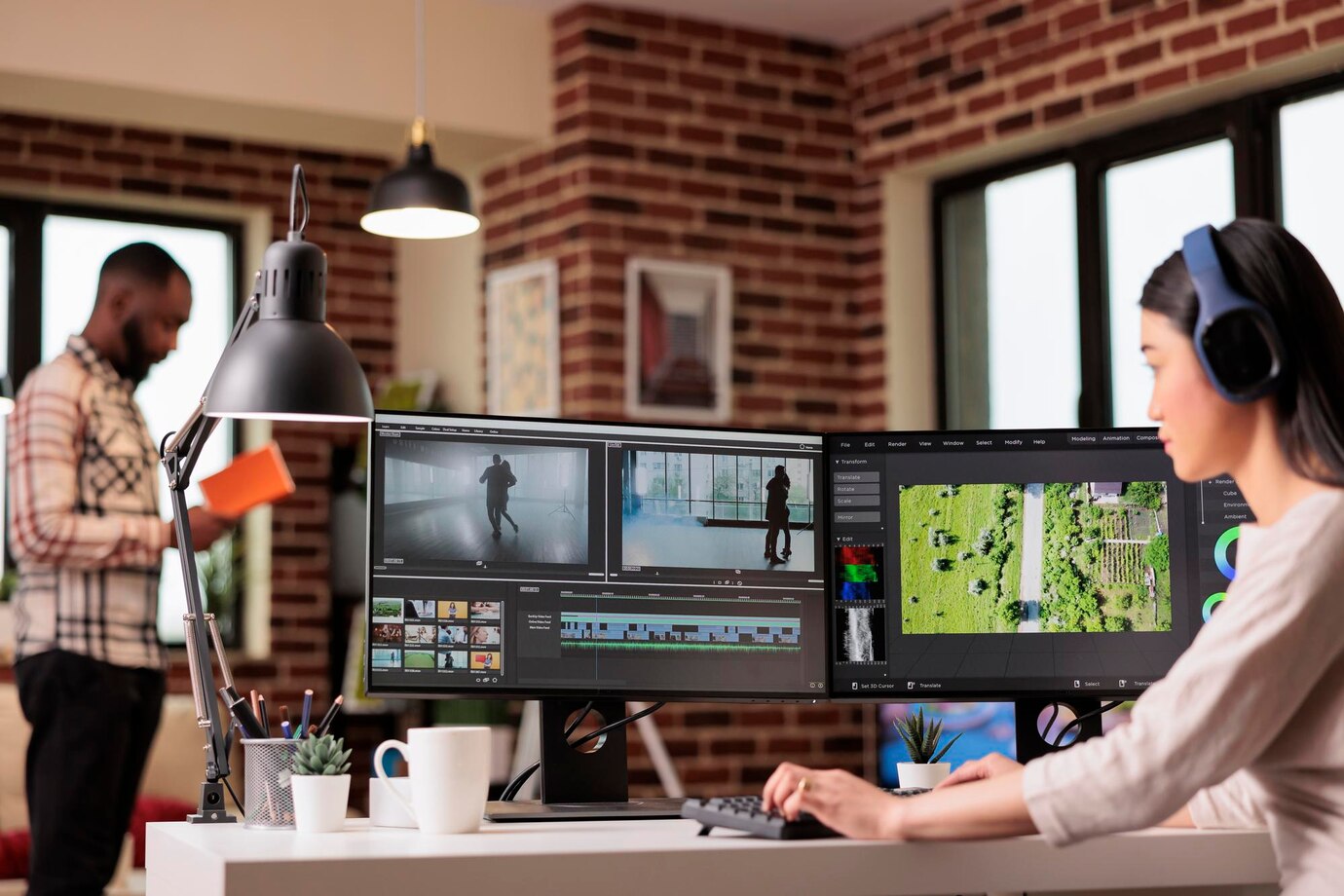Are you itching to dive into the captivating world of video creation? Look no further! Whether you’re a seasoned videographer or just starting out, finding inspiration for your next project is essential. In this article, we’ll explore a plethora of tools for online video editing to ignite your creativity and take your filmmaking skills to new heights. From cinematic short films to eye-catching promotional videos, there’s something here for everyone. So grab your camera, fire up your editing software, and let’s bring your vision to life!
Video Projects
Embarking on the journey of video projects opens doors to a realm where creativity knows no bounds. In a world dominated by visual content, videos stand out as powerful mediums of expression and communication. Whether you’re an aspiring filmmaker or someone eager to share knowledge, the allure of crafting compelling visuals is undeniable.
Video projects encompass a broad spectrum, from educational content that enlightens and instructs, to short films that encapsulate captivating narratives. The allure lies not only in the final product but also in the creative process — a voyage where ideas take shape, stories unfold, and individuality finds its voice. As we delve into the world of video projects, let’s uncover the diverse opportunities they present and the profound impact they can have on both creators and audiences alike.
Benefits of Engaging in Video Projects
Engaging in video projects offers a myriad of advantages that extend beyond mere creativity. Here are some compelling reasons why diving into the world of video production can be immensely rewarding:
- Educational Benefits: Video projects serve as invaluable educational tools, facilitating experiential learning and skill development. Through the process of creating videos, individuals hone their abilities in scripting, filming, editing, and storytelling, enhancing their cognitive and practical aptitudes.
- Creative Outlet: For many, video projects provide a much-needed creative outlet, allowing them to unleash their imagination and express themselves artistically. Whether it’s crafting visually stunning narratives or experimenting with avant-garde techniques, video production offers endless possibilities for self-expression and exploration.
- Career Opportunities: The burgeoning demand for video content across various industries translates into abundant career prospects for aspiring filmmakers and content creators. By engaging in video projects, individuals can build impressive portfolios, showcase their talents, and pave the way for lucrative opportunities in fields such as filmmaking, advertising, journalism, and digital media.
- Communication and Engagement: In an era dominated by digital communication, videos have emerged as powerful mediums for engaging and captivating audiences. Video projects enable creators to connect with viewers on a deeper level, conveying messages, evoking emotions, and fostering meaningful interactions that resonate long after the screen fades to black.
In essence, the benefits of engaging in video projects extend far beyond the realm of filmmaking, encompassing educational, creative, professional, and personal dimensions. Whether you’re a novice filmmaker or a seasoned content creator, the allure of video projects lies in their capacity to inspire, empower, and transform both creators and audiences alike.
Types of Video Projects
| Type of Video Project | Description | Examples |
| Educational Videos | Informative content aimed at teaching or explaining concepts, processes, or skills. | Tutorial videos, instructional guides, educational documentaries |
| Short Films | Narrative-driven cinematic works typically ranging from a few minutes to half an hour in length. | Dramas, comedies, thrillers, experimental films |
| Documentaries | Non-fictional films that aim to document reality, shed light on social issues, or capture significant events. | Investigative documentaries, nature documentaries, biographical films |
| Vlogs | Personal video diaries that offer glimpses into the daily lives, experiences, and adventures of content creators. | Travel vlogs, lifestyle vlogs, cooking vlogs |
Engaging in video projects opens doors to a diverse range of creative endeavors, each with its unique appeal and purpose. Here’s a closer look at the different types of video projects and what sets them apart:
- Educational Videos: Educational videos serve as invaluable resources for learning and skill development. Whether they’re instructional tutorials, educational documentaries, or how-to guides, these videos aim to impart knowledge and facilitate understanding on a wide range of topics.
- Short Films: Short films are cinematic works characterized by their concise storytelling and compelling narratives. Ranging from dramas and comedies to thrillers and experimental films, short films offer filmmakers a platform to showcase their storytelling prowess and creative vision within a limited time frame.
- Documentaries: Documentaries offer a window into the real world, exploring diverse subjects, issues, and perspectives through non-fiction storytelling. From investigative exposés to nature documentaries and biographical profiles, documentaries capture the essence of reality and provoke thought, empathy, and understanding.
- Vlogs: Vlogs, or video blogs, provide a personal and authentic glimpse into the lives, experiences, and adventures of content creators. Whether it’s sharing travel adventures, daily routines, or hobby pursuits, vlogs offer viewers a direct connection with the creators and a sense of intimacy and authenticity.
Choosing the Right Video Project
When it comes to selecting the right video project to embark upon, it’s essential to consider both your interests and your skill set. Here are two key aspects to keep in mind:
Assessing Your Skills and Interests
Before diving into a video project, take stock of your strengths, weaknesses, and passions. Consider what types of content resonate with you the most and where your expertise lies. Whether you excel in storytelling, cinematography, or editing, aligning your project with your skills and interests will ensure a more fulfilling and successful endeavor.
Setting Goals
Once you’ve identified your strengths and interests, it’s crucial to establish clear goals for your video project. Determine what you hope to achieve, whether it’s honing your craft, building a portfolio, or reaching a specific audience. Setting realistic and measurable goals will provide direction and motivation throughout the production process, guiding your creative decisions and ensuring that your project stays on track.
Equipment and Software Needed
When embarking on a video project, having the right equipment and software is essential to ensure smooth production and high-quality results. Here are the key components you’ll need:
Cameras and Accessories
- Camera: Choose a camera that suits your budget and requirements, whether it’s a DSLR, mirrorless camera, or camcorder.
- Lenses: Invest in a selection of lenses to achieve different perspectives and visual effects.
- Tripod: A sturdy tripod is essential for stable shots, especially for static scenes or time-lapse photography.
- Memory Cards: Ensure you have ample storage space with high-capacity memory cards to store your footage.
Editing Software
- Video Editing Software: Select a robust video editing software that offers a wide range of editing tools and features. Popular options include Adobe Premiere Pro, Final Cut Pro, and DaVinci Resolve.
- Audio Editing Software: Don’t overlook the importance of sound quality. Use audio editing software such as Adobe Audition or Audacity to enhance your audio tracks and eliminate background noise.
- Graphic Design Software: If your project involves creating graphics or titles, consider using graphic design software like Adobe Photoshop or Adobe After Effects.
Lighting and Sound Equipment
- Lighting Kit: Proper lighting is crucial for achieving professional-looking results. Invest in a lighting kit with softboxes, LED panels, or studio lights to control the intensity and direction of light.
- Microphones: Choose the right microphone for your recording needs, whether it’s a shotgun microphone for capturing dialogue or a lavalier microphone for interviews. Don’t forget to use a windscreen or pop filter to reduce unwanted noise.
- Audio Recorder: For high-quality audio recording, consider using an external audio recorder to capture sound separately from your camera. This allows for more flexibility during the editing process and ensures cleaner audio.
Having the right equipment and software is key to bringing your creative vision to life and producing professional-quality videos. Take the time to research and invest in the tools that best suit your needs and budget, and don’t hesitate to experiment with different techniques and technologies to enhance your production value.

